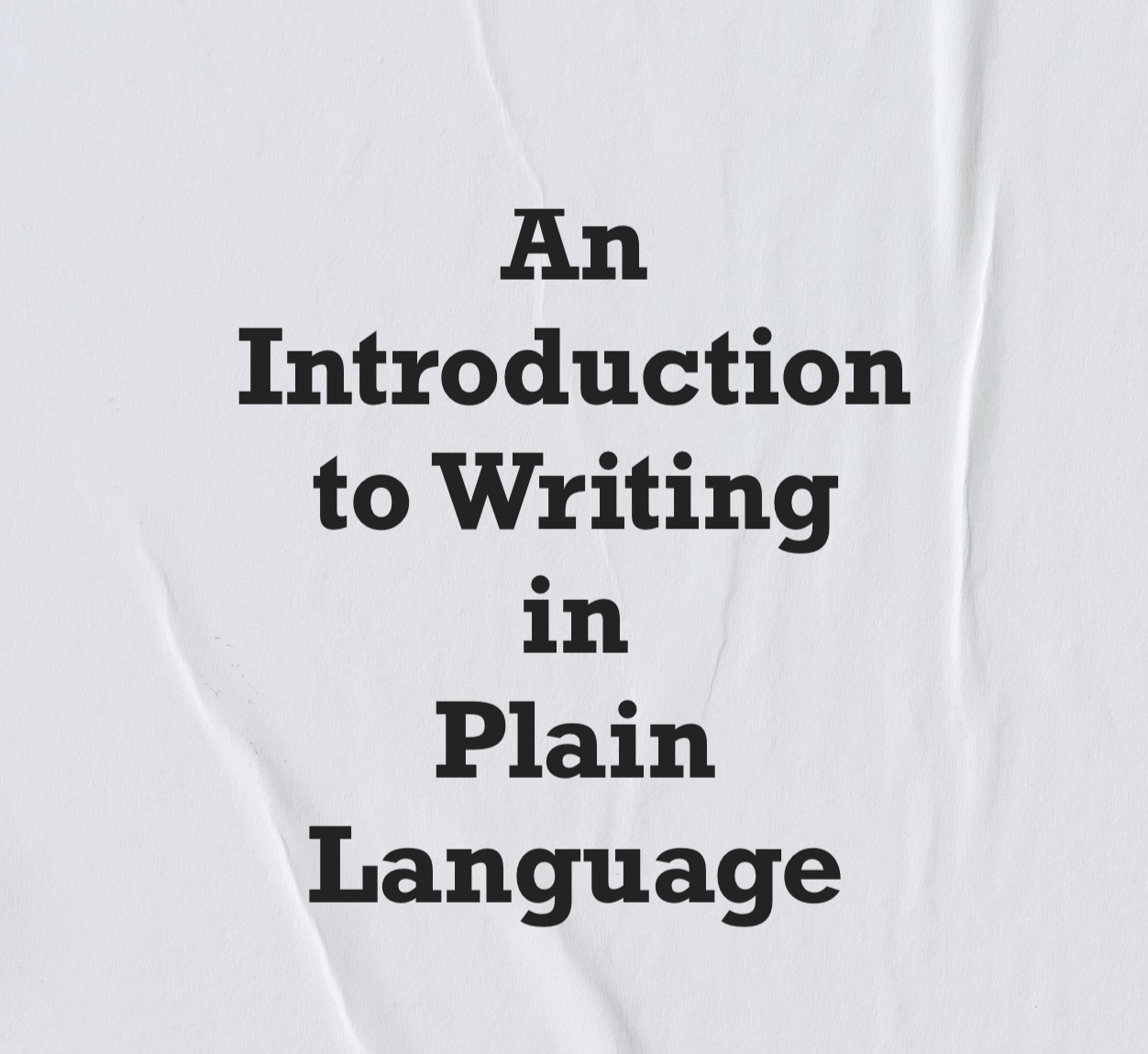Plain legal English
I notice that you use plain, simple language, short words and brief sentences. That is the way to write English – it is the modern way and the best way. Stick to it; don’t let fluff and flowers and verbosity creep in.
Click Above
Phrasal Verbs
to set out
to run out
to jot down
to go over
to hang out
Phrasal Verbs
to sum up
to carry out
to show up
to fill out
to turn into
Start here with …
… what to avoid in plain legal English.
Hidden Verbs
String Nouns
Jargon
Omit, Cut & Eliminate
What are hidden verbs?
A hidden verb (or nominalization) is a verb converted into a noun. It often needs an extra verb to make sense.
For example, “Please make an application for a mortgage” is longer and less clear than “Please apply for a mortgage.”
Avoid hidden verbs.
Use the strongest, most direct form of the verb possible.
Verbs are the fuel of writing – they give your sentences power and direction. They liven up your writing and make it more interesting. Too often, we hide verbs by turning them into nouns, making them less effective and using more words than we need.
Technical writing, contracts, and government regulations are full of hidden verbs. They make our writing weak and longer than necessary.
Which are the hidden verbs?
Weak
We conduct an analysis of the data …
Please make an application for a …
They will make an announcement …
Strong
We analyze the data …
Please apply for a …
They will announce …
to analyze
to apply
to announce
Weak
Active verbs make your writing stronger.
Passive verbs make your writing weaker.
Strong
Active verbs strengthen your writing.
Passive verbs weaken your writing.
to weaken
to strengthen
Weak
We are responsible for management of the program …
They gave us information about the college.
We will make a decision about remote work opportunities by Friday.
Strong
We _____ the program …
They _____ us about the college.
We will _____ remote work opportunities by Friday.
to manage
to inform
to decide
Weak
He should take into consideration how hard the team worked on the last project.
The area must give a performance on the skills they have acquired.
We must show a presentation about the market risks.
Strong
He should consider how hard the team worked on the last project.
The area must perform the skills they have acquired.
We must present the market risks.
to consider
to perform
to present
Hidden verbs come in two forms.
1
Some have endings such as -ment, -tion, -sion, and -ance
-ment
achievement
acknowledgement
disappointment
government
improvement
-tion
deduction
invention
installation
translation
interpretation
-sion
transmission
supervision
conclusion
expansion
division
-ance
allowance
guidance
maintenance
assistance
division
2
Or others link with verbs such as give, make, reach, and take.
to give
a recommendation
a suggestion
a speech
an answer
permission
to make
a decision
a sacrifice
a donation
an invention
an interpretation
to reach
a conclusion
an agreement
a point
a place
a consensus
to take
a decision
a break
part in
a risk
a deduction
Use these verbs more.
to manage
to analyze
to apply
to announce
to perform
to present
to strengthen
to weaken
to inform
to decide
to consider
Avoid String Nouns
The bulk of government and technical writing uses too many noun strings, or groups of nouns “sandwiched” together. Readability suffers when three words that are ordinarily separate nouns follow in succession. Once you get past three, the string becomes unbearable.
Technically, clustering nouns turns all but the last noun into adjectives. However, many users will think they’ve found the noun when they’re still reading adjectives, and will become confused.
Bring these constructions under control by eliminating descriptive words that aren’t essential. If you can’t do that, open up the construction by using more prepositions and articles to clarify the relationships among the words.
Weak
Underground mine worker safety protection procedures development.
Draft laboratory animal rights protection regulations.
National Highway Traffic Safety Administration’s automobile seat belt interlock rule.
Strong
Developing procedures to protect the safety of workers in underground mines.
Draft regulations to protect the rights of laboratory animals.
The National Highway Traffic Safety Administration’s interlock rule applies to automotive seat belts.
Avoid Jargon
Jargon is unnecessarily complicated language used to impress, rather than to inform, your audience.
When we say not to use jargon, we’re not advocating leaving out necessary technical terms, but we are saying to make sure your language is as clear as possible. For example, there may not be another correct way to refer to a “brinulator valve control ring.” But that doesn’t prevent you from saying “tighten the brinulator valve control ring securely” instead of “Apply sufficient torque to the brinulator valve control ring to ensure that the control ring assembly is securely attached to the terminal such that loosening cannot occur under normal conditions.” The first is a necessary use of a technical term. The second is jargon.
Special terms can be useful shorthand within a particular audience and may be the clearest way to communicate with that group. However, going beyond necessary technical terms to write in jargon can cause misunderstanding or alienation, even if your only readers are specialists.
Readers complain about jargon more than any other writing fault, because writers often fail to realize that terms they know well may be difficult or meaningless to their audience. Try to substitute everyday language for jargon as often as possible. Consider the following pairs. The plainer version conveys technical information just as accurately as and more clearly than the jargon-laden version.
General Jargon
Don’t Say
riverine avifauna
involuntarily undomiciled
Say
river birds
homeless
When you have no way to express an idea except to use technical language, make sure to define your terms. However, it’s best to keep definitions to a minimum. Remember to write to communicate, not to impress. If you do that, you should naturally use less jargon.
Don’t Say
The patient is being given positive-pressure ventilatory support.
Most refractory coatings to date exhibit a lack of reliability when subject to the impingement of entrained particulate matter in the propellant stream under extended firing durations.
Say
The patient is on a respirator.
The exhaust gas eventually damages the coating of most existing ceramics.
Legal Jargon
Legal language is a major source of annoying jargon. Readers can do without archaic jargon such as “hereafter,” “heretofore,” and “therewith.”
Professor Joseph Kimble (2006), a noted scholar on legal writing, warns that we should avoid words and formalisms that give legal writing its musty smell. He includes the following words in his list of examples:
- above-mentioned
- aforementioned
- foregoing
- henceforth
- hereafter
- hereby
- heretofore
- herewith
- thereafter
- thereof
- therewith
- whatsoever
- whereat
- wherein
- whereof
Shall
“Shall” is also losing its popularity in legal circles. Obviously, it’s especially important in regulations to use words of authority clearly, and many legal writing experts recommend avoiding the archaic and ambiguous “shall” in favor of another word, depending on your meaning.
Business Jargon
Here is a brief list of meaningless filler phrases:
- Thinking outside the box
- Value added
- Best practice
- For all intents and purposes
- Touch base
- Integrating quality solutions
- Promoting an informed and synergistic teams
- Strategically engaging departments, and so on…
Use the same terms consistently.
You will confuse your audience if you use different terms for the same concept or object. For example, if you use the term “senior citizens” to refer to a group, continue to use this term throughout the material. Don’t substitute another term, such as “the elderly” or “the aged.” Using a different term may cause the reader to wonder if you’re referring to the same group.
You don’t need to use synonyms to make your writing more interesting. Federal writers are not creating literature. You are communicating requirements, how to get benefits, how to stay safe and healthy, and other information to help people in their lives. While using different words may make writing more interesting, it can decrease clarity.
Check your prepositions.
Don’t Say
a number of
a sufficient number of
at this point in time
is able to
on a monthly basis
on the grounds that
an amount of X
be responsible for
in order to
Say
several, a few, or many
enough
now
can
monthly
because
X
must
to
Be Concise.
Wordy, dense construction is one of the biggest problems in government writing. Nothing is more confusing to the user than long, complex sentences containing multiple phrases and clauses. Unnecessary words come in all shapes and sizes, and it’s difficult to put them into distinct categories. To address the problem, become more critical of your own writing, and consider whether you need every word. Challenge every word—do you need it?
Pronouns, active voice, and base verbs help eliminate excess words. So does eliminating unnecessary modifiers—in “HUD and FAA issued a joint report” you don’t need “joint.” In “this information is really critical” you don’t need “really.”
Unnecessary words waste your audience’s time. Great writing is like a conversation. Omit information that the audience doesn’t need to know. This can be difficult as a subject matter expert so it’s important to have someone look at the information from the audience’s perspective.
Omit & Cut
Omit redundant words.
Don’t Say
The X Department and the Y Department worked together on a joint project to improve…
Say
The X and Y Departments worked on a project to improve…
In this statement, you don’t need “joint.” You don’t even need “together.” Saying that X and Y worked on a project says it all. “Joint” and “together” are redundant.
Cut excess modifiers.
We often use modifiers like absolutely, actually, completely, really, quite, totally, and very. But if you look closely, you’ll find that they’re probably not necessary and may even be nonsensical.
Don’t Say
Their claim was totally unrealistic.
It is particularly difficult to reconcile the somewhat differing views expressed by the management team.
Total disclosure of all facts is very important to make sure we draw up a total and completely accurate picture of the Agency’s financial position.
Say
Their claim was absurd.
It is difficult to reconcile the differing views expressed by the management team.
Ex. 1 ____________________________
Avoid doublets and triplets.
Don’t Say
due and payable
cease and desist
begin and commence
knowledge and information
Say
due
stop
start
(either one)
Practical Application
This example below uses several of the techniques discussed above to cut a 54 word sentence down to 22 words, with no loss of meaning.
22 words.
Don’t Say
If the State Secretary finds that an individual has received a payment to which the individual was not entitled, whether or not the payment was due to the individual’s fault or misrepresentation, the individual shall be liable to repay to State the total sum of the payment to which the individual was not entitled.
Say
Can you fix this statement?
22 words.
If the State agency finds that you received a payment that you weren’t entitled to, you must pay the entire sum back.
This guide was created for Harvard Library employees, but we hope it’s helpful to a wider community of content creators, editors, producers — anyone who’s trying to communicate a message online.
Where do you go from here? There are lots of ways to dive deeper into plain language and English.
Learn about the Plain English, Associated Press & More
Prepositions – In & At
In the case of place, these prepositions have the different meanings.
I am in the hospital. (You are getting treatment)
I am at the hospital. (You are visiting someone there)
You are in school. (You are studying)
You are at school. (You are eating lunch and playing basketball)
You are in the office. (You are working)
You are at the office. (You are “working” 😉
See your level in just 5 minutes.
We can teach you legal English.
About the Author
Eric Froiland
Eric is a legal English teacher from the United States and has been based out of Bogota, Colombia for the last 10 years. He is the owner and founder of Legal English Innovation SAS, which is recognized as the top legal English academy in Colombia and is an official Test of Legal English Skills (TOLES) examination center.



